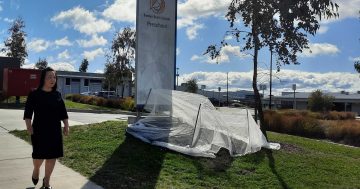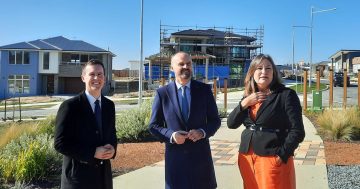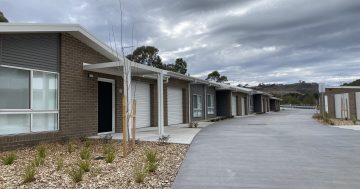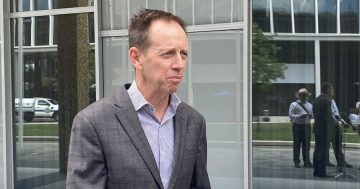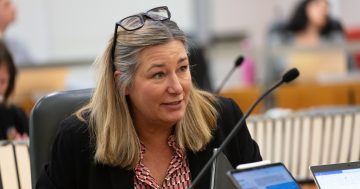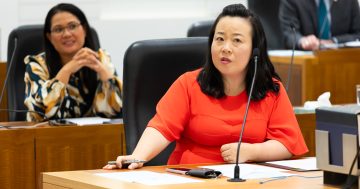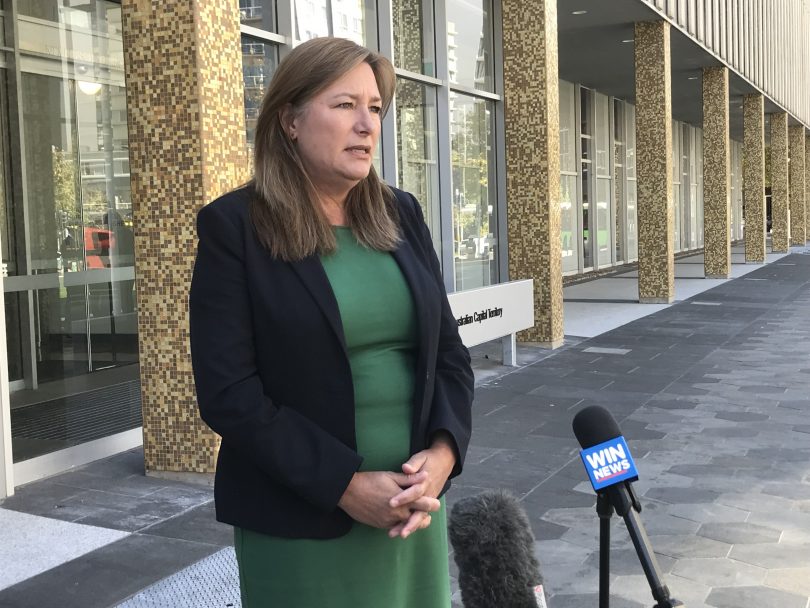
Under pressure: Deputy Chief Minister Yvette Berry faces the media. Photo: Lottie Twyford.
It hasn’t been a good week for Chief Minister Andrew Barr to fall ill.
A number of issues exposed cracks in the government and highlighted how difficult an act Mr Barr will be to follow if he decides to pull the plug on his political career at the 2024 election.
With the help of some touchstone controversies, the Canberra Liberals were able to apply the blowtorch to his Deputy Yvette Berry. The latter’s responses have relied on well-worn talking points and flat denial.
It doesn’t matter if the Opposition is short on actual ideas of its own. We’re a long way from the next election, and all it has to do is shine a spotlight on the government’s failings.
The ACT multiple portfolio system allows issues to pile up and intensify scrutiny on a minister.
This week, Ms Berry’s first backflip was on forced relocations of public housing tenants that wasn’t a backflip.
Then the Campbell Primary procurement, which looks likely to be the subject of an Integrity Commission inquiry, followed by the revelations of violence at Calwell High School.
The Opposition made merry with documents released under Freedom of Information that indicated that Ms Berry was aware of probity issues with the Campbell Primary tender well before the Auditor-General’s report.
Not exactly a smoking gun, but enough to raise doubts about her denials.
Opposition Leader Elizabeth Lee said Ms Berry was also in denial about the level of violence in ACT schools.
It didn’t help to have the teachers union contradicting Ms Berry’s claim that violence is rare in ACT schools.
Instead of being open and transparent about what was happening at Calwell High, she tried to blame the student violence on teachers and staff shortages because of COVID-19.
Inevitably, word got out and blew up in the Minister’s face.
Years after rolling out the Respectful Relationships program to counter such violence, there is not much respect happening at Calwell High.
The Liberals also renewed their attack on the government for allegedly restricting the release of land to maintain prices and support its infill policy.
Again, no alternative program, just the repetition of the message that Labor-Green policies contributed to runaway home prices and forced people into units when many would prefer their own patch of dirt. As Minister for Housing and Suburban Development, Ms Berry was again in the line of fire.
Another union, this time the nurses, came out to berate the government on the running of its Dhulwa mental health unit, warning that escalating violence meant a catastrophic event was imminent.
And to top off the sitting week, a review of the ACT’s jail, the Alexander Maconochie Centre, was tabled, detailing a poor culture and not enough staff in an overcrowded prison.
It came on the same day as the Inspector of Corrections tabled a review of a critical incident last year in which allegedly drunk detainees lit a fire causing $3.7 million in damage.
Sitting weeks lend themselves to political embarrassments, but the accumulation of issues, particularly something as core to government services as school safety, means its basic competence is being questioned more and more.
The Opposition’s focus is sharper and ministers are facing more pressure than before when they could easily brush off attacks.
There are ironies, of course. The Liberals complaining about cuts to public education, for example, and championing public housing tenants are but two.
But ministers who may be potential successors to Mr Barr are being tested and being found wanting.
Ms Berry has never really been considered Chief Minister material. That mantle seems to have fallen to Health Minister Rachel Stephen-Smith and Transport and City Services Minister Chris Steel.
Ms Stephen Smith has been in the crucible of the pandemic, while Mr Steel has Canberra’s major infrastructure projects, including light rail, although he is probably still too young.
Of course, if by the odd chance the ACT went even more Green in 2024, that would bring Shane Rattenbury into the frame, and many would argue that he would make a decent Chief Minister.
Mr Barr is such a dominant force in the government and the Assembly that his departure will leave a big hole if he decides he doesn’t have another election in him.
This week shows that without him, the government is vulnerable. While by 2024 it hopes to be able to tick off several big achievements such as the Canberra Hospital expansion and the start of light rail stage 2A, it can’t afford to allow issues to fester.
The Liberals, after such a long time out of office, will keep hammering away at the government’s failures and may well be finding a receptive audience under Elizabeth Lee’s leadership.
But they too, come, 2024, will need to come up with a few answers of their own.
And unions won’t be so eager to help.












